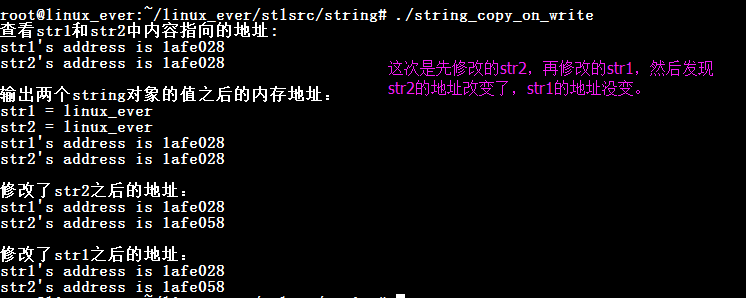STL——STL中string的寫時拷貝機制
string的寫時拷貝機制是為了提高效率。STL中許多類都採用了該機制(Copy-on-Write),該技術確實使STL的程式有著比較高的效率。
string類中有一個私有成員變數char *ch,該變數指向該類從堆上分配的記憶體,其在構造的時候分配記憶體,在析構的時候釋放記憶體。
輸出:
string類中有一個私有成員變數char *ch,該變數指向該類從堆上分配的記憶體,其在構造的時候分配記憶體,在析構的時候釋放記憶體。
寫時拷貝的意思是:在例子中string str1 = "linux_ever"; string str2 = str1;可以看到str1和str2中的指標變數指向相同的記憶體地址。當改變str的內容的時候才拷貝該物件。
從程式的輸出結果中看出:
string str1 = "linux_ever";執行完之後,str1物件的內容就是"linux_ever",會呼叫複製建構函式。
string str2 = str1;//執行完之後,會呼叫str2的複製建構函式,str2中的指標成員變數指向剛才str1中指向成員變數指向的記憶體單元。
當修改了str1的時候,就將str1的記憶體單元重新分配,將之前指向的記憶體單元中的記憶體拷貝過來,並修改相應的值。理所應當地,剛才的記憶體空間被str2單獨佔用了。所以接下來即使修改了str2的值,它的地址也沒有發生改變。
在第二個程式中,先修改了str2,所以就將str2的記憶體單元重新分配,將之前指向的記憶體單元中的記憶體拷貝過來,並修改相應的值。理所應當地,剛才的記憶體空間被str1單獨佔用了。所以接下來即使修改了str1的值,它的地址也沒有發生改變。
先修改str1,再修改str2:
/*************************************************************************
> File Name: string_copy_on_write.cpp
> Author:
> Mail:
> Created Time: 2016年03月25日 星期五 20時22分39秒
************************************************************************/
#include <iostream>
#include <string>
#include <stdio.h>
using namespace std;
int main()
{
string str1 = "linux_ever";
string str2 = str1;
cout << "檢視str1和str2中內容指向的地址: " << endl;
printf("str1's address is %x\n", str1.c_str());
printf("str2's address is %x\n", str2.c_str());
cout << "\n輸出兩個string物件的值之後的記憶體地址:" << endl;
cout << "str1 = " << str1 << endl;
cout << "str2 = " << str2 << endl;
printf("str1's address is %x\n", str1.c_str());
printf("str2's address is %x\n", str2.c_str());
cout << "\n修改了str1之後的地址:" << endl;
str1[0] = 'u';
printf("str1's address is %x\n", str1.c_str());
printf("str2's address is %x\n", str2.c_str());
cout << "\n修改了str2之後的地址:" << endl;
str2[0] = 'w';
printf("str1's address is %x\n", str1.c_str());
printf("str2's address is %x\n", str2.c_str());
return 0;
}
輸出:
先修改str2,再修改str1:
/*************************************************************************
> File Name: string_copy_on_write.cpp
> Author:
> Mail:
> Created Time: 2016年03月25日 星期五 20時22分39秒
************************************************************************/
#include <iostream>
#include <string>
#include <stdio.h>
using namespace std;
int main()
{
string str1 = "linux_ever";
string str2 = str1;
cout << "檢視str1和str2中內容指向的地址: " << endl;
printf("str1's address is %x\n", str1.c_str());
printf("str2's address is %x\n", str2.c_str());
cout << "\n輸出兩個string物件的值之後的記憶體地址:" << endl;
cout << "str1 = " << str1 << endl;
cout << "str2 = " << str2 << endl;
printf("str1's address is %x\n", str1.c_str());
printf("str2's address is %x\n", str2.c_str());
cout << "\n修改了str2之後的地址:" << endl;
str2[1] = 'u';
printf("str1's address is %x\n", str1.c_str());
printf("str2's address is %x\n", str2.c_str());
cout << "\n修改了str1之後的地址:" << endl;
str1[1] = 'w';
printf("str1's address is %x\n", str1.c_str());
printf("str2's address is %x\n", str2.c_str());
return 0;
}
相關文章
- [轉]C++ 之 stl::string 寫時拷貝導致的問題C++
- STL——STL中vector的實現原理
- C++---寫時拷貝解決深淺拷貝問題C++
- STL 庫其中的 std::string用法總結
- 深入剖析 linux GCC 4.4 的 STL stringLinuxGC
- STL標準模組庫:容器string模組
- STL(十七)string基本字元序列容器字元
- Netty(二)—— NIO 零拷貝機制Netty
- JavaScript中的淺拷貝與深拷貝JavaScript
- VUE 中 的深拷貝和淺拷貝Vue
- STL
- 理解JS中的淺拷貝與深拷貝JS
- PHP中的淺拷貝和深拷貝薦PHP
- 進階篇_STL中的容器
- VC++中STL的使用 (轉)C++
- 《STL原始碼剖析》 -- stl_algo.h原始碼Go
- 《STL原始碼剖析》-- stl_algobase.h原始碼Go
- 《STL原始碼剖析》-- stl_hashtable.h原始碼
- 《STL原始碼剖析》-- stl_multimap.h原始碼
- 《STL原始碼剖析》-- stl_map.h原始碼
- 《STL原始碼剖析》-- stl_multiset.h原始碼
- 《STL原始碼剖析》-- stl_set.h原始碼
- 《STL原始碼剖析》-- stl_tree.h原始碼
- 《STL原始碼剖析》-- stl_heap.h原始碼
- 《STL原始碼剖析》-- stl_slist.h原始碼
- 《STL原始碼剖析》-- stl_queue.h原始碼
- 《STL原始碼剖析》-- stl_stack.h原始碼
- 《STL原始碼剖析》-- stl_deque.h原始碼
- 《STL原始碼剖析》-- stl_list.h原始碼
- 《STL原始碼剖析》-- stl_pair.h原始碼AI
- 《STL原始碼剖析》-- stl_vector.h原始碼
- 《STL原始碼剖析》-- stl_iterator.h原始碼
- 《STL原始碼剖析》-- stl_uninitialized.h原始碼Zed
- 《STL原始碼剖析》-- stl_alloc.h原始碼
- 淺談Java中的淺拷貝和深拷貝Java
- STL::pairAI
- STL中set用法詳解
- STL中map用法詳解

